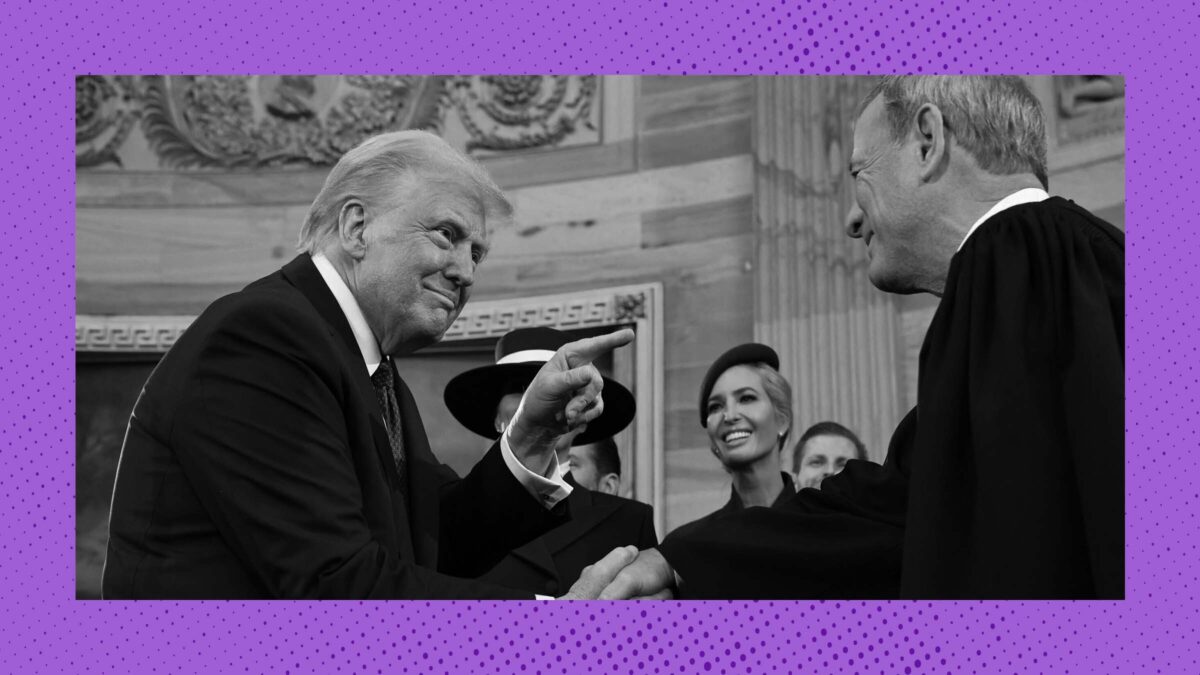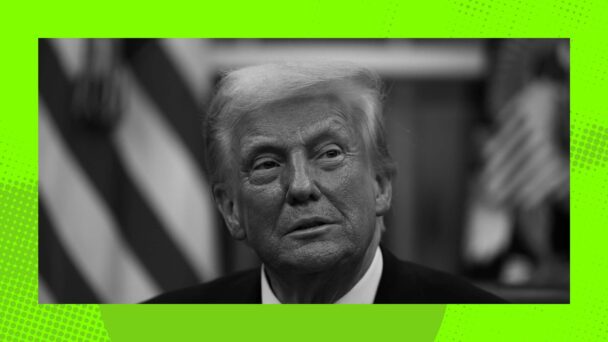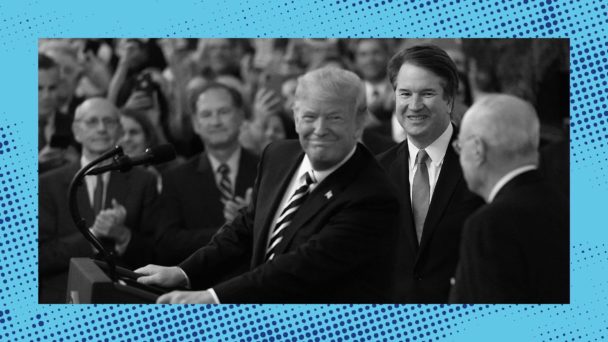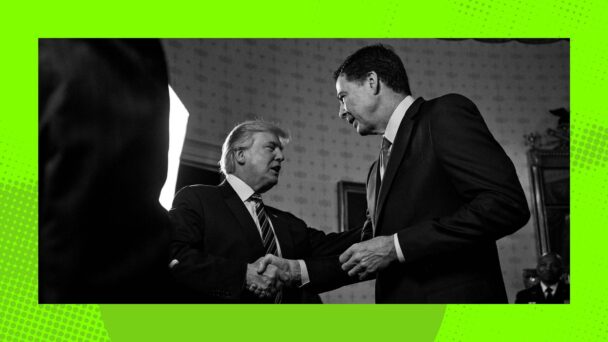The Supreme Court heard oral argument on Thursday in Trump v. CASA, the case about President Donald Trump’s executive order attempting to rescind the Constitution’s grant of birthright citizenship. States and activists filed multiple lawsuits challenging the order as a violation of the Fourteenth Amendment. And as those cases are ongoing, three federal district courts granted nationwide preliminary injunctions—a type of interim relief that stops Trump from implementing his order unless and until courts decide the order is legal.
Without those injunctions, the executive order would have already threatened the citizenship status of hundreds of thousands of children born in the United States. Trump is now asking the Court to narrow the injunctions so that they apply solely to the plaintiffs in each case—effectively asking for a permission slip to violate the rights of everyone who isn’t part of the lawsuit.
It should not be difficult for the Court to deny such a request. Yet the Court and many Court- watchers are wringing their hands here—not (necessarily) over the order itself, but over the use and, sometimes, abuse of nationwide injunctions. These injunctions have proliferated in recent years, frustrating people across the political spectrum. While one district court judge may block Trump’s lawlessness, another judge—say, a judge in Amarillo, Texas—may become the go-to guy for any aggrieved conservative who wants a ruling that forces right-wing policies on the rest of the country. So now, instead of applying the standard for reviewing preliminary injunctions, the justices are fussing over whether nationwide injunctions should exist at all.
But this hemming and hawing confuses the issue of injunction abuse with the actual issue in Trump v. CASA. In this case, the Supreme Court doesn’t need to review all nationwide injunctions. It only needs to review this particular nationwide injunction. And that task is easy. There are four simple factors that courts are supposed to use to evaluate this kind of temporary relief, and every one of them clearly cuts against Trump.
1. The Executive Order Sure Looks Unlawful
A judge issuing or lifting a preliminary injunction is supposed to consider which party is likely to succeed on the case’s merits. Here, that means asking, “What’s the likelihood that the birthright citizenship order is illegal?” And the answer to that question is, “High. Like, higher than Snoop Dogg on an airplane.”
The Fourteenth Amendment of the Constitution says all persons born in the United States and subject to its jurisdiction are citizens. The Supreme Court recognized over a century ago that the Amendment “affirms the ancient and fundamental rule of citizenship by birth within the territory.” Trump cannot now take out a Sharpie and scribble an addendum reading “so long as at least one of their parents is a citizen or legal permanent resident.” But that’s what his order purports to do. The Constitution doesn’t work like that. One of the district courts that enjoined the order described the government’s position as “unavailing and untenable,” and another characterized the plaintiffs’ likelihood of success on the merits as “extremely strong.”
At oral argument, the administration veered further into the absurd. Solicitor General D. John Sauer repeatedly contended that the aforementioned ancient rule of birthright citizenship posed “novel” questions and needed to “percolate.” He also insisted that citizenship depends on lawful permanent residence, and that the Fourteenth Amendment was only intended to confer citizenship on the children of formerly enslaved people. Among other problems, this doesn’t account for the parents of those children, to whom the Fourteenth Amendment also granted citizenship. And no one vulnerable under the transatlantic slave trade can be reasonably understood to have had any kind of permanent residence.
2. The Risk of Harm to the Government is Nonexistent
The next factor judges are supposed to weigh when evaluating preliminary injunctions is the risk of irreparable harm. Here, that means asking, “Will the government experience some impossible-to-remedy harm if it isn’t allowed to implement the birthright citizenship order nationwide before the case is over?” And the answer to that question is, “Obviously not.”
The government will not experience unrepairable injury if it has to—let me check my notes, ah yes—keep following the Constitution as it has been understood and applied for the past 127 years. In general, there is no harm for the government in maintaining the status quo. That is even truer in this specific case where the disruption to the status quo is violating the Fourteenth Amendment.
3. The Risk of Harm to American Families is Almost Unimaginable
This factor is the corollary of the previous one—judges must weigh the parties’ interests and hardships. Here, that means asking, “Will it cause more harm to keep the nationwide order in place or lift it?” And the answer to that question is, “Lifting it is undoubtedly more harmful.”
American families have a significant interest in safeguarding their children’s constitutional rights. That includes the rights and benefits which flow from citizenship. And that, crucially, includes keeping their children safe from deportation.
The government may argue that it does have an interest in resolving the issue of inappropriate nationwide injunctions. But there’s no evidence that the scope of the birthright citizenship injunctions is inappropriate, especially considering that the nonprofit organizational plaintiffs have members across the country; protecting their fundamental rights therefore would require an injunction that spans across the country. Abstract concerns about nationwide injunctions being improper in some cases cannot trump its clear necessity in this case.
4. The Harm to Multiracial Democracy Itself is Indefensible
The final factor judges are supposed to consider is the harm to the public interest. Here, that means asking, “Is it in the public’s interest to leave the nationwide injunction in place while the trial proceeds?” And the answer is, “Without question.”
Sauer emphasized at oral argument that the government was only asking the Court to narrow the scope of the injunctions blocking the birthright citizenship order, and not asking whether the order is illegal. But letting it go into effect anywhere, as applied to anyone, would mean reestablishing an antebellum constitutional order in which fundamental rights hinge on ancestry and citizenship varies from state to state. Narrowing the scope of the birthright citizenship injunction, perhaps more than any other modern Supreme Court decision, would provide incontrovertible proof that the United States is governed not in accordance with laws, but with white supremacist prerogatives.
Trump v. CASA should not be a hard case. Questions like “Does the Constitution mean what it says?” and “Do presidents have to follow the law?” should be easy for any American to answer, and even easier for the most powerful jurists in the country. Each of the four factors that judges are supposed to weigh when evaluating preliminary injunctions make it clear that the Trump administration should lose. The Supreme Court’s reactionary supermajority is the only reason it may not.






